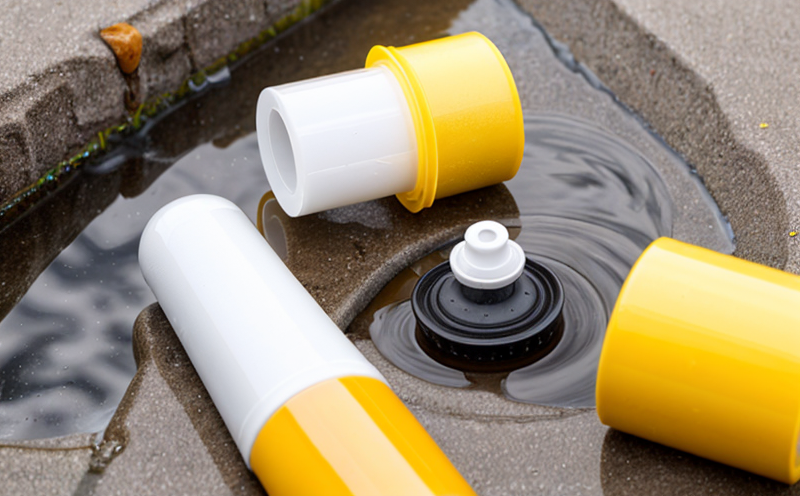ASTM D257 Moisture resistance of insulating materials
The ASTM D257 standard is widely recognized as a key method for evaluating moisture resistance in insulating materials. This test measures the ability of an insulating material to resist water penetration, which is crucial in ensuring the long-term performance and reliability of insulation products used in various sectors such as electronics, building construction, and aerospace. The methodology involves exposing the specimen to controlled conditions that simulate real-world exposure to moisture.
The process begins with careful preparation of the test specimens according to ASTM D257 requirements. Specimens are typically cut from larger pieces to ensure uniformity and representativeness. Following preparation, the specimens are subjected to a water spray or immersion in distilled water for a specified duration, depending on the material type and intended application.
During the test, the specimen is placed inside a chamber where it undergoes exposure to controlled humidity levels. The moisture resistance is quantified by measuring the amount of electrical leakage current that passes through the specimen during this period. Leakage current readings are taken periodically throughout the test duration. This allows for accurate determination of how much water has penetrated the material.
The results from ASTM D257 testing provide valuable insights into the performance characteristics of insulating materials under various environmental conditions. Compliance with this standard ensures that products meet industry standards and customer expectations regarding moisture resistance, thereby enhancing product reliability and safety.
- Water Spray Exposure: Specimens are exposed to a steady stream of distilled water for a specified time period.
- Immersion Testing: Suitable specimens are fully immersed in distilled water for a predetermined duration.
- Humidity Chamber: The specimen is placed in a controlled humidity environment throughout the test process.
- Electrical Leakage Current Measurement: Continuous monitoring and recording of electrical leakage current provide critical data on moisture resistance performance.
The ASTM D257 test not only helps manufacturers ensure product quality but also aids in identifying potential weaknesses within materials early in the development cycle. By incorporating this testing into their quality assurance processes, companies can improve overall product durability and reduce costs associated with warranty claims or recalls due to moisture-related issues.
Scope and Methodology
The ASTM D257 test specifically addresses the evaluation of moisture resistance in insulating materials. This includes determining the electrical insulation properties of these materials when exposed to water under specified conditions. The scope encompasses both laboratory testing scenarios as well as field applications where moisture exposure might occur.
In terms of methodology, ASTM D257 specifies several key parameters including specimen preparation methods, test chamber configurations, and acceptable tolerances for results interpretation. Specimens must be prepared according to precise dimensions outlined in the standard document; any deviation could lead to inaccurate test outcomes. Additionally, the type of water used (distilled) and the duration of exposure are critical factors that influence the accuracy of moisture resistance assessments.
The electrical insulation performance is assessed through continuous monitoring of leakage current during the exposure period. Leakage currents below specified thresholds indicate higher levels of moisture resistance. Conversely, excessive leakage suggests poor moisture barrier effectiveness, highlighting areas for improvement in material composition or manufacturing processes.
Why Choose This Test
- Precision and Reliability: ASTM D257 provides a precise means of assessing moisture resistance, ensuring reliable data that can be consistently reproduced across different laboratories.
- Compliance Assurance: By adhering to this standard, manufacturers ensure their products meet regulatory requirements and industry best practices.
- Quality Control: Regular ASTM D257 testing helps identify potential flaws in material design or manufacturing processes early on, allowing for timely corrective actions.
- Customer Satisfaction: Providing products with excellent moisture resistance enhances customer confidence and satisfaction, leading to better market acceptance and repeat business opportunities.
The ASTM D257 test stands out as a robust tool in the arsenal of quality assurance professionals seeking to enhance product performance and durability. Its rigorous protocols and standardized procedures make it an indispensable part of any comprehensive testing program aimed at insulating materials.
Customer Impact and Satisfaction
The implementation of ASTM D257 testing has a direct positive impact on customer satisfaction by ensuring that the products meet stringent quality standards. This translates into enhanced reliability, reduced failure rates, and increased longevity of the end product. For customers in sectors like electronics manufacturing or building construction, where moisture resistance is paramount, compliance with this standard means they can trust their suppliers to deliver high-quality materials.
Moreover, successful completion of ASTM D257 testing demonstrates a commitment to excellence that builds long-term relationships between supplier and customer. It also facilitates smoother regulatory processes by avoiding potential delays caused by non-compliance issues. Overall, adherence to ASTM D257 not only satisfies current market demands but also positions companies as leaders in their respective fields.





